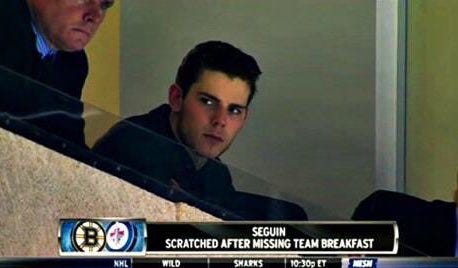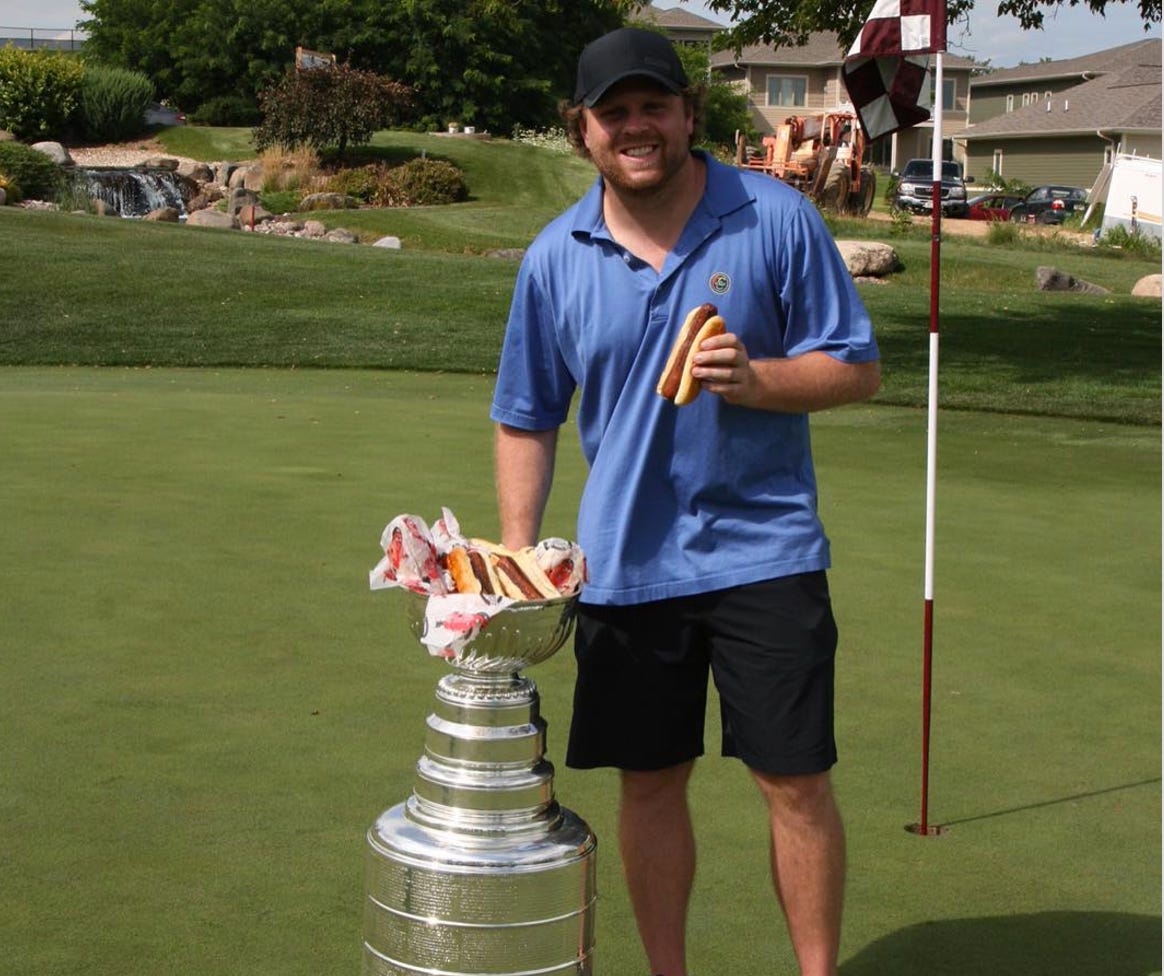delay of game research & sources
and a sale!
First of all, some exciting news—Game Misconduct is on sale for $1.99, September 15th through the 29th, at most major North American retailers.
If you haven’t read it yet, now is a great time to do so, since Delay of Game will be out in the world in two months.
On to the main topic of this post. I thought it might be fun to do another little deep dive regarding the research and inspirations for some of the issues that informed Delay of Game (while doing my best to avoid spoilers). I did one for Game Misconduct as well, if you’re interested, and the full bibliography of sources is linked both here and on my website.
Delay of Game is a very different book than Game Misconduct—it’s a friends-to-lovers story, so the whole vibe is completely, well, opposite. That’s not to say that it doesn’t touch on some serious issues, as well, because while I’m primarily writing romance novels I’m also interested in interrogating aspects of hockey culture and examining the ways in which those prevailing norms really screw up hockey players. The sport offers such a wealth of sources of conflict, both internal and external, that it’s really a shame not to dig in further.
In Delay of Game, both Nate and Zach have their issues they’ve got to work through before they can fall in love and eventually make it to their happy ending.
Zach
Zach has a variety of inspirations, because unfortunately, throughout the history of the NHL there have been so many guys who got swept up in the lifestyle of the professional athlete. The easy availability of drugs (specifically cocaine) and alcohol and women, and, well. The consequences be damned.
One specific inspiration was:
I was really interested in exploring how the fall from grace of a young superstar—a high draft pick, promising career, Stanley Cup under his belt so early in his hockey days—might affect his pscyhe. The shame and embarrassment and the chip on his shoulder, as well as the desire to prove everyone who had ever doubted him wrong.
Zach was lucky that his downward spiral was abruptly snapped by the trade and by meeting Nate, who from the beginning, believed in him so much that Zach started believing in himself again. When we meet him in Game Misconduct and Delay of Game he’s still dealing, a little bit, with some of that, but he’s changed a lot as a person already. Now it’s just a weight on his shoulders that he needs to keep pushing forward and win again—not even for himself, but for Nate.
Nate
Nate’s character is pretty much the polar opposite of Zach’s. He’s always been the steady, dependable one, the guy who always follows the rules and does the right thing at the expense of his own happiness. And the underpinnings of all of that are some incredibly intense anxiety disorders and equally low self-esteem, which also manifests itself as body dysmorphia.
I think as a whole, being a pro athlete is probably incredibly anxiety inducing. Hockey, in general, seems to attract high achieving personalities with both perfectionistic and obsessive-compulsive streaks. There have been a number of players who have talked about their struggles with their mental health and specifically anxiety: Colin Wilson and Corey Hirsch and Mark Borowiecki with OCD; Shane Corson with generalized anxiety and panic attacks so bad they led to his walking out on the Leafs in the middle of a playoff series.
More recently, Slater Koekkoek has essentially retired because his debilitating anxiety wouldn’t allow him to eat before games when he was around teammates. In a game as calorically demanding as hockey, the fact that he managed to play as long as he did while dealing with this is incredibly impressive. Koekkoek said:
I left the game because my life inside of it had gotten to a place that was unbearable and unhealthy towards my mental health. I would say I played a majority of my professional games without the ability to eat much, if anything, the night before and the day of the games. Hockey Night in Canada on a completely empty stomach? Let’s do this, I guess . . . .
I would get comments from teammates saying “hey Kooks you know the meals are free” due to my weight dwindling, without them knowing the pain I was going through. I would hear from GMs and Coaches that I needed to put on weight if I was to battle in the corners with the elite of the league not to mention the energy needed to complete these tasks as well. That just put on increased pressure.
Koekkoek’s specific experiences with anxiety also dove-tailed with something else I wanted to explore with Nate’s self-esteem and body-image issues. He wrote,
But when being continuously scrutinized for my on ice performance it caused a downward spiral. A vicious cycle of needing to eat but physically being unable. Be kind to one another because you never know what someone might be going through. And stop commenting on people’s weight . . . it’s friggen weird.
Hockey bodies aren’t like the bodies of professional athletes in other sports: the vast majority of players don’t have washboard abs. They have insane core strength and lower body strength by necessity, but might not have the kind of showy muscles that you see in other professions. Nevertheless, the media and even team are often relentless when it comes to players’ bodies and commenting on them.
There are numerous players in recent years who have dropped in the draft rankings due to concerns about their “conditioning,” which is a more polite way of saying their weight, but everyone knows what that means. Two that I can think of just on the Habs are Joshua Roy, drafted in the fifth round, and Jacob Fowler, in the third round.
Roy has since worked INSANELY hard to improve his skating and conditioning, and was rewarded with a gold medal at the World Juniors last year, and an entry-level contract with the Habs.
Fowler, on the other hand, did well in his draft year. He had a .921 SV% and a 2.28 GAA in the regular season, but he really stood out in the playoffs. There, he went 8-1-0, with 1.36 GAA and a .952 SV%, and won USHL Goaltender of the Year and Clark Cup MVP. Even so, several other goalies were chosen before him, and following the draft, a scout was quoted as stating, “As far as weaknesses, I think the general concern comes down to fitness level and conditioning . . . His style doesn’t require him to be acrobatic or explosive, which is good, but I think you want a goalie that you’re going to be able to rely on for long stretches. Maintaining the quickness that he has could work, but I think teams would like to see him a little quicker in certain aspects.”
And you only have to watch the Habs’ behind the scenes video of the draft to get a clear image about how driven to succeed Fowler is, and how aware he is of the way people viewed and talked about him. And how determined he is to prove EVERYONE wrong. And I truly believe that kid’ll do it, too.
It doesn’t stop when you get to the NHL, either. Phil Kessel, a three-time Stanley Cup champion and current holder of the NHL’s Iron Man record for longest streak of active game played, is the brunt of many jokes online about his shape and general physical appearance and supposed love of hot dogs (Steve Simmons once led an article with an anecdote that Kessel would buy a hot dog almost every afternoon).
There’s an image of him with hot dogs in the Stanley Cup—again, aware of the criticisms.
“He has a sense of humor. He has a memory like an elephant, never forgets, but he has a sense of humor,” said Simmons.
“And a body like one!” chimed in Landsberg, lest we forget how this all began.
Absolutely shameless, really.
Pat Maroon, also a three-time Stanley Cup champion at 6’ 3” and 230-something pounds, had to deal with broadcaster Jack Edwards’ on-air remarks during a game:
“Listed at 238 pounds, that was Day 1 of training camp, I’ve got a feeling he’s had a few more pizzas between then and now,” Edwards said with a laugh.
“That’s before pregame,” Brickley added.
“(Intermittent) fasting for Pat Maroon is like four hours without a meal,” Edwards continued between laughs. “Hey, three (Stanley) Cups in a row, who can argue with it?”
Edwards later issued an apology, and Maroon turned a negative into a positive, raising $60k for a local nonprofit that focuses on strengthening behavioral health outcomes. But the fact remains, Edwards felt comfortable and easy making jokes about the weight and health and eating habits of an athlete who is, by all objective measures, incredibly successful.
This isn’t unusual: this is just the sport.
It’s online, it’s on TV, it’s in the scouting reports.
So this is where we get Nate’s character: a shy, anxious nerdy kid who also loved hockey and didn’t have a typical body for it. Someone who internalized all of the negative messaging that he was getting from a very young age about his appearance. Someone who did indeed drop in the draft due to “concerns about conditioning” and was insanely conscious of what, exactly, had happened. Someone also with a chip on his shoulder and a desire to work hard enough to prove people wrong, but also someone who still struggled with his body image and what he looks like. Someone who, even if he doesn’t necessarily look the way he used to, is just flat-out unable to see himself the way other people see him.
The guys
The book is a romance, but at its heart, it’s also about Nate and Zach’s friendship. How over the past three years they’ve known each other (and loved each other), they’ve been focused on trying to build each other up, encourage each other to be better, and help each other make it to the next level and the ultimate goal.
And it’s also about both of their insecurities, and how they’re so damn hard to move on from, and the ways that the sport can screw up your self-preception and health both physical and mental, and all of the unexpected fallout from that.
I never know how to end these things, RIP. So I’ll just close by saying that if there’s ever anything in the books where you’re thinking “that’s insane, that would never happen” … the fact of the matter is, there’s at least a 95% chance I based that on a specific incident that did happen in real life, haha.
Anyway, happy reading, and if you ever have any questions or want recommendations for non-fiction about hockey… I’m your guy.
— Ari 🧡
Selected Sources
Allain, Kristi A. “‘A Good Canadian Boy’: Crisis Masculinity, Canadian National Identity, and Nostalgic Longings in Don Cherry’s Coach’s Corner.” International Journal of Canadian Studies, vol. 52, 2015, pp. 107–32. Crossref, https://doi.org/10.3138/ijcs.52.107.
Allain, Kristi A. “‘Real Fast and Tough’: The Construction of Canadian Hockey Masculinity.” Sociology of Sport Journal, vol. 25, no. 4, 2008, pp. 462–81. Crossref, https://doi.org/10.1123/ssj.25.4.462.
Allain, Kristi A. “‘What Happens in the Room Stays in the Room’: Conducting Research with Young Men in the Canadian Hockey League.” Qualitative Research in Sport, Exercise and Health, vol. 6, no. 2, 2013, pp. 205–19. Crossref, https://doi.org/10.1080/2159676x.2013.796486.
Boynton, Nick. “Everything’s Not O.K.” The Players’ Tribune, 13 June 2018, www.theplayerstribune.com/articles/nick-boynton-everythings-not-ok.
Branch, John. Boy on Ice: The Life and Death of Derek Boogaard. Reprint, W. W. Norton and Company, 2015.
Carcillo, Daniel. “Gone.” The Players’ Tribune, 22 Apr. 2015, www.theplayerstribune.com/articles/nhl-daniel-carcillo-steve-montador-video.
Carcillo, Daniel. “I Can’t Live Like That Anymore.” The Players’ Tribune, 13 June 2018, www.theplayerstribune.com/videos/daniel-carcillo-head-trauma.
Carcillo, Daniel. “The Fourth Period.” The Players’ Tribune, 8 June 2016, www.theplayerstribune.com/articles/daniel-carcillo-hockey-concussions-depression-steve-montador-2016-6-8.
Dumont, Marc. “Canadiens Prospect Jacob Fowler’S NHL Goaltending Potential.” Montreal Hockey Now, July 2023, montrealhockeynow.com/2023/07/07/montreal-canadiens-prospect-jacob-fowlers-nhl-goaltending-potential-scouting-report-profile-ushl-ncaa.
“Former NHL Player Shayne Corson Opens up About Anxiety Problem: ‘It Took Over My Life.’” Nationalpost, 4 July 2017, nationalpost.com/sports/baseball/mlb/former-nhl-player-shayne-corson-opens-up-about-anxiety-problem-it-took-over-my-life.
Hirsch, Corey. “Dark, Dark, Dark, Dark, Dark, Dark by Corey Hirsch | The Players’ Tribune.” The Players’ Tribune, 16 Feb. 2017, www.theplayerstribune.com/articles/corey-hirsch-dark-dark-dark.
Hirsch, Corey. “I’m Not Brave at All.” The Players’ Tribune, 28 Jan. 2021, www.theplayerstribune.com/articles/corey-hirsch-nhl-hockey-mental-health.
Hirsch, Corey. “You Are Not Alone.” The Players’ Tribune, 25 June 2018, www.theplayerstribune.com/articles/corey-hirsch-you-are-not-alone.
MacDonald, Cheryl, et al. Overcoming the Neutral Zone Trap: Hockey’s Agents of Change. University of Alberta Press, 2022.
MacDonald, Cheryl. “That’s Just What People Think of a Hockey Player, Right?”: Manifestations of Masculinity among Major Junior Ice Hockey Players. Masters Thesis, Concordia University, 2012.
MacDonald, Cheryl. “Yo! You Can’t Say That!”: Understandings of Gender and Sexuality and Attitudes Towards Homosexuality Among Male Major Midget AAA Ice Hockey Players in Canada. PhD thesis, Concordia University, 2016.
O’Connor, Charlie. “Lightning’s Pat Maroon Responds to NESN Broadcast Mocking by Turning ‘Negative Into a Positive.’” The Athletic, 2 Dec. 2022, theathletic.com/3957977/2022/12/02/pat-maroon-jack-edwards-charity-nhl.
“Oilers Defenceman Slater Koekkoek Details Struggles With Anxiety.” Sportsnet.ca, www.sportsnet.ca/nhl/article/oilers-defenceman-slater-koekkoek-details-struggles-with-anxiety.
Robidoux, Michael. Men at Play: A Working Understanding of Professional Hockey. First, McGill-Queen’s University Press, 2001.
Smith, Joe. “What Broadcaster Jack Edwards Said in His Apology to Lightning’s Pat Maroon: ‘We Got It Out.’” The Athletic, 27 Jan. 2023, theathletic.com/4128805/2023/01/26/nhl-pat-maroon-jack-edwards-apology.
Wheeler, Scott. “How Canadiens Draft Pick Joshua Roy Rebuilt Himself Into the Top Prospect He Was Always Meant to Be.” The Athletic, 13 Dec. 2021, theathletic.com/3003371/2021/12/13/how-canadiens-draft-pick-joshua-roy-rebuilt-himself-into-the-top-prospect-he-was-always-meant-to-be.
Wilson, Colin. “Addiction by Colin Wilson.” The Players’ Tribune, 25 Oct. 2021, www.theplayerstribune.com/posts/colin-wilson-nhl-hockey-addiction.
Wilson, Colin. “The Things You Can’t See.” The Players’ Tribune, 23 Nov. 2020, www.theplayerstribune.com/posts/colin-wilson-nhl-hockey-mental-health.



